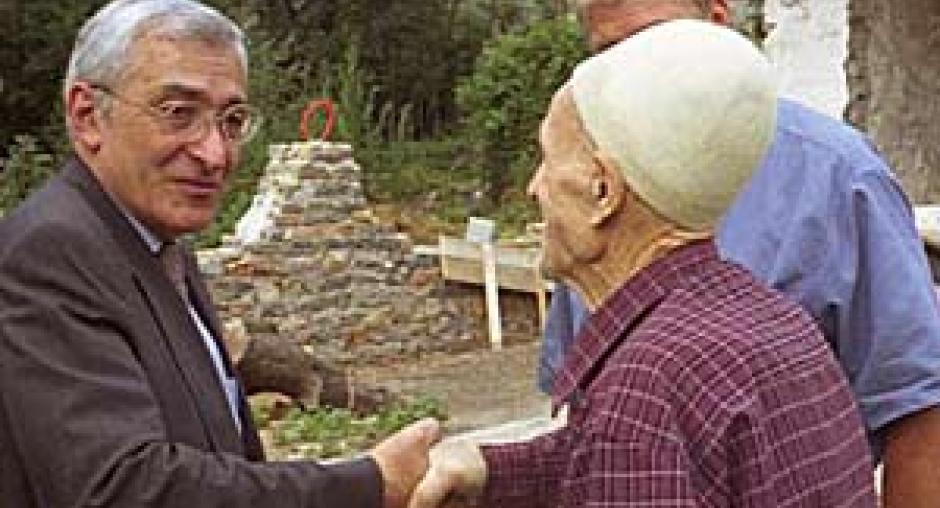Newsroom
Head of OSCE Kosovo Mission: mutual respect is key to success
PRISTINA 23 October 2003

(OSCE)Head of Mission Pascal Fieschi visits new returnees to Biti e Epërme/Gornja Bitinja in Kosovo, July 2003. (OSCE) Photo details
PRISTINA, 23 October 2003 - Kosovo is gradually facing up to the challenge of self-government, but international help will still be necessary for some time yet, in order to ensure self-sustainable progress, Ambassador Pascal Fieschi, Head of the OSCE Mission in Kosovo, said on Thursday.
"Kosovo must function as a society where rule of law prevails, human rights are respected, where no group suffers discrimination, and where nepotism is no longer a main element in public appointments and tenders," he told the 55-nation OSCE Permanent Council in Vienna.
"And it must be also a unit which is integrated into its region and promotes stability rather than discord. A productive dialogue is a necessary step in building a responsible regional role as many of Kosovo's problems cannot be solved within Kosovo alone."
Ambassador Fieschi said that every year the basic goals for Kosovo remained the same - a democratic society where people of different backgrounds could live together in mutual acceptance, responsible self-government, and ultimately integration into the region and Europe: "Our task is to ensure that Kosovo will become a society fit to form part of the European family."
He reminded the OSCE's main policy and negotiating body that while the transfer of powers to local bodies from the international community institutions in Kosovo was difficult, a partnership model was more likely to produce positive results than a series of confrontations.
"Our method is to persuade and influence, not to insist or impose. This reflects the consensus-building basis of the OSCE as a whole, and reflects our mandate, which is the development of people and institutions, rather than direct executive power," said Ambassador Fieschi.
But he believed that that while consensus building was slow, it was necessary work. OSCE activities have included monitoring the progress of the Assembly of Kosovo and consultation in solving governance problems at the municipal level.
"Mutual respect will be the key to success in the next phase of Kosovo's development," he stressed. "The OSCE model of partnership has an important role to play in helping Kosovo evolve from a troubled past into a stable future."
The OSCE, the institution-building pillar within the United Nations Mission in Kosovo, has already taken a number of steps to ensure that OSCE-created institutions, when handed over, are sustainable and will continue to work for Kosovo.
"Kosovo must function as a society where rule of law prevails, human rights are respected, where no group suffers discrimination, and where nepotism is no longer a main element in public appointments and tenders," he told the 55-nation OSCE Permanent Council in Vienna.
"And it must be also a unit which is integrated into its region and promotes stability rather than discord. A productive dialogue is a necessary step in building a responsible regional role as many of Kosovo's problems cannot be solved within Kosovo alone."
Ambassador Fieschi said that every year the basic goals for Kosovo remained the same - a democratic society where people of different backgrounds could live together in mutual acceptance, responsible self-government, and ultimately integration into the region and Europe: "Our task is to ensure that Kosovo will become a society fit to form part of the European family."
He reminded the OSCE's main policy and negotiating body that while the transfer of powers to local bodies from the international community institutions in Kosovo was difficult, a partnership model was more likely to produce positive results than a series of confrontations.
"Our method is to persuade and influence, not to insist or impose. This reflects the consensus-building basis of the OSCE as a whole, and reflects our mandate, which is the development of people and institutions, rather than direct executive power," said Ambassador Fieschi.
But he believed that that while consensus building was slow, it was necessary work. OSCE activities have included monitoring the progress of the Assembly of Kosovo and consultation in solving governance problems at the municipal level.
"Mutual respect will be the key to success in the next phase of Kosovo's development," he stressed. "The OSCE model of partnership has an important role to play in helping Kosovo evolve from a troubled past into a stable future."
The OSCE, the institution-building pillar within the United Nations Mission in Kosovo, has already taken a number of steps to ensure that OSCE-created institutions, when handed over, are sustainable and will continue to work for Kosovo.
